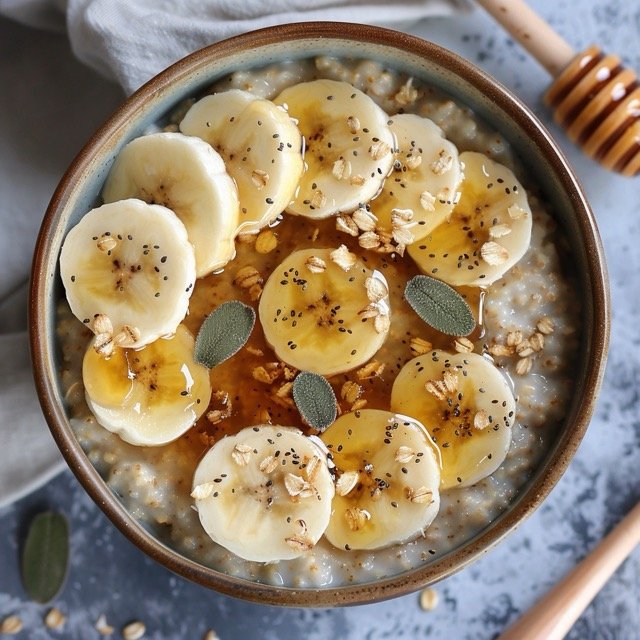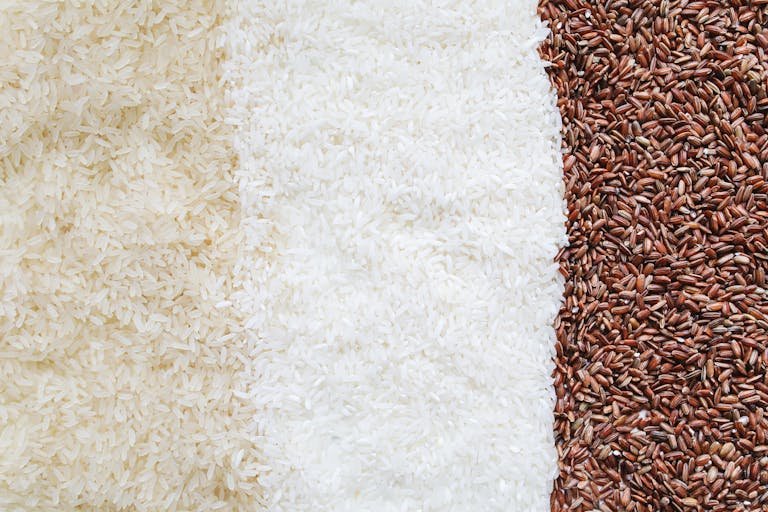7-Day Meal Plan for Ulcerative Colitis: A Better You
Managing ulcerative colitis (UC), a chronic inflammatory bowel disease, often requires a multifaceted approach, including medication, lifestyle changes, and, importantly, dietary modifications. A well-structured 7-day meal plan can significantly alleviate symptoms, reduce inflammation, and improve overall health. This article presents a comprehensive and informative 7-day meal plan for Ulcerative Colitis, emphasizing the importance of a balanced diet in maintaining remission and enhancing quality of life.
Key Aspects of the Diet
1. Low-Fiber Foods:
- Rationale: High-fiber foods can exacerbate symptoms during a flare-up. Therefore, focusing on low-fiber foods helps reduce bowel irritation.
- Examples: White bread, white rice, peeled and cooked fruits and vegetables.
- Case Study: A 2018 study published in the Journal of Crohn’s and Colitis showed that a low-fiber diet significantly reduced symptoms in patients during active flare-ups.
2. Lean Proteins:
- Rationale: Proteins are essential for healing and repair, especially during flare-ups when the body needs extra nutrients.
- Examples: Skinless poultry, lean cuts of pork, tofu, and fish.
- Data: According to the Crohn’s & Colitis Foundation, incorporating lean proteins can aid in reducing inflammation and promoting healing.
3. Healthy Fats:
- Rationale: Healthy fats provide essential fatty acids that help reduce inflammation.
- Examples: Olive oil, avocados, and omega-3-rich fish like salmon.
- Statistics: A 2020 meta-analysis in Nutrients found that omega-3 fatty acids significantly reduce inflammation in UC patients.
4. Probiotics:
- Rationale: Probiotics help maintain a healthy gut microbiome, which is crucial for individuals with UC.
- Examples: Yogurt with live cultures, kefir, and sauerkraut.
- Case Study: A study in the World Journal of Gastroenterology in 2019 reported that probiotic supplementation led to remission in a significant number of UC patients.
5. Hydration:
- Rationale: Staying hydrated is essential, as UC can cause dehydration due to diarrhea.
- Examples: Water, herbal teas, and electrolyte solutions.
- Data: The Mayo Clinic emphasizes that maintaining hydration can help manage symptoms and improve overall health.
Day-by-Day: 7-Day Meal Plan for Ulcerative Colitis
Day 1
Breakfast: Scrambled Eggs with White Toast

Scrambled eggs with white toast are on the 7-Day Meal Plan for Ulcerative Colitis list (UC) for several reasons:
Digestibility and UC Considerations
Eggs:
- Eggs are a good source of protein, which is essential for maintaining overall health and can help with healing during UC flares.
- Eggs are relatively easy to digest and can be a good option for people with UC.
White Toast:
- White toast is low in fiber, which can benefit people with UC who may need to limit their fiber intake during flare-ups.
- However, it is high in carbohydrates, which can increase stool output and worsen symptoms if not balanced with other nutrient-dense foods.
Tips for Preparation and Consumption
Cooking Methods:
- Scrambled eggs should be cooked gently to avoid overcooking, which can make them difficult to digest.
- Use a non-stick pan and add butter to prevent sticking and enhance flavor.
Portion Control:
- Eat smaller, more frequent meals to manage symptoms and ensure proper digestion.
- Start with a small serving size and adjust according to individual tolerance.
Additional Tips:
- Avoid adding high-fiber or spicy ingredients to the scrambled eggs, as they can trigger symptoms.
- Add omega-3 fatty acids, such as those found in fish oil, to help reduce inflammation.
In summary, if prepared and consumed carefully, scrambled eggs with white toast can be a good breakfast option for people with ulcerative colitis. It is essential to cook the eggs gently, control portion sizes, and avoid adding trigger ingredients. Balancing this meal with other nutrient-dense foods and considering omega-3 fatty acids can help manage symptoms and promote overall health.
Snack: Banana Smoothie with Almond Milk
Banana smoothies with almond milk can be a nutritious and beneficial option for people with ulcerative colitis (UC), but it’s essential to consider the specific needs and sensitivities of each individual. Here are some reasons why it’s on the 7-Day Meal Plan for Ulcerative Colitis list:
Benefits of Banana Smoothies
- Easy to digest: Banana smoothies are often well-tolerated by people with UC, as bananas are easy to digest and help bind water, reducing diarrhea.
- Probiotics and fiber: Bananas contain prebiotic fiber, which can help support the growth of beneficial bacteria in the gut.
- Nutrient-rich: Bananas are a good source of vitamins, minerals, and antioxidants, which can help combat inflammation and oxidative stress.
Considerations for Almond Milk
- Low fiber: Almond milk is naturally low in fiber, which can benefit those with UC who may need to limit fiber intake during flares.
- Calcium content: Almond milk is often fortified with calcium, which is essential for maintaining bone health, especially for those with UC who may have increased calcium needs.
- Potential irritants: Some almond milk may contain additives like carrageenan, which can cause symptoms to flare up in some individuals.
Tips for a UC-Friendly Banana Smoothie with Almond Milk
- Choose unsweetened almond milk: Opt for unsweetened almond milk to avoid added sugars that can exacerbate symptoms.
- Select ripe bananas: Use ripe bananas, which are easier to digest and less likely to cause discomfort.
- Add probiotics: Add probiotic-rich ingredients like yogurt or kefir to support gut health.
- Monitor your body: Pay attention to how your body reacts to the smoothie. If you experience discomfort or symptoms, adjust the ingredients or consult with a healthcare professional.
In summary, a banana smoothie with almond milk can be a nutritious and beneficial option for people with ulcerative colitis, but it’s crucial to consider individual sensitivities and choose ingredients carefully.
Lunch: Grilled Chicken Breast with White Rice and Steamed Carrots

Grilled chicken breast with white rice and steamed carrots are on the 7-Day Meal Plan for Ulcerative Colitis list (UC) for several reasons:
Grilled Chicken Breast
- Lean Protein: Grilled chicken breast is a lean protein source recommended for people with UC as it is easier to digest and less likely to trigger symptoms.
- Easy to Digest: Plainly cooked chicken breast is a good option during both flare-ups and symptom-free periods, as it is gentle on the digestive system.
White Rice
- Low Fiber: White rice is a low-fiber food, which is beneficial during flare-ups as it reduces the amount of residue in the digestive tract, helping to alleviate symptoms.
- Soluble Fiber: White rice contains soluble fiber, which breaks down and digests in the large intestine and colon, producing soft stool and better digestion.
- Easy to Digest: White rice is often recommended as it is easy to digest and can help minimize discomfort during flare-ups.
Steamed Carrots
- Low Fiber: Steamed carrots are a low-fiber vegetable option suitable for flare-ups to reduce digestive discomfort.
- Easy to Digest: Steaming carrots makes them easier to digest, reducing the risk of irritation and discomfort in the digestive tract.
- Nutrient-Rich: Carrots are nutrient-rich, providing essential vitamins and minerals without exacerbating UC symptoms.
In summary, this meal benefits people with Ulcerative Colitis because it includes lean protein, low-fiber foods that are easy to digest, and nutrient-rich vegetables. These components help minimize discomfort, reduce symptoms, and support overall digestive health during flare-ups and symptom-free periods. All These reasons highlight why this meal can be a staple for a 7-day Meal Plan for Ulcerative Colitis.
Snack: Greek Yogurt with Honey
Greek yogurt with honey is on the 7-Day Meal Plan for Ulcerative Colitis list (UC) for several reasons:
Benefits:
Probiotics:
- Greek yogurt is rich in probiotics, which are beneficial bacteria that can help maintain a healthy gut flora. This can be particularly important for people with UC, as an imbalance in gut bacteria is often associated with flare-ups and inflammation.
Protein:
- Greek yogurt is a good protein source, essential for tissue repair and overall health. High protein intake can also help maintain muscle mass, especially if UC symptoms lead to weight loss or decreased appetite.
Calcium and Vitamin D:
- Greek yogurt is rich in calcium and often fortified with vitamin D, which are important for bone health. People with UC are at higher risk of osteoporosis, so maintaining adequate levels of these nutrients is crucial.
Easy to Digest:
- Greek yogurt is generally easier to digest than other dairy products, as it contains less lactose. This can be beneficial for individuals with UC who may have lactose intolerance or sensitivities.
Honey:
Anti-Inflammatory Properties:
- Honey has natural anti-inflammatory properties, which can help soothe the digestive tract. This can benefit people with UC, as inflammation is a key component.
Natural Sweetener:
- Honey is a natural sweetener that can make Greek yogurt more palatable without the need for processed sugars, which can sometimes aggravate UC symptoms.
Considerations:
Individual Tolerance:
- Everyone with UC has different triggers. While Greek yogurt with honey can benefit some, others may not tolerate it well. Monitoring your body’s response and adjusting your diet is important.
Portion Control:
- Consuming Greek yogurt with honey in moderation is key. Excessive intake of any food, even beneficial ones, can potentially lead to digestive discomfort.
Sugar Content:
- While honey is a natural sweetener, it still contains sugar, which can concern some people with UC. Monitoring the amount of honey added is important to avoid excessive sugar intake.
Greek yogurt with honey can be a good option for people with Ulcerative Colitis, providing probiotics, protein, and anti-inflammatory benefits.
However, individual tolerance varies, so it’s essential to monitor how your body responds and consult a healthcare provider or dietitian to tailor your diet to your needs.
Dinner: Baked Salmon with Mashed Potatoes and Steamed Zucchini
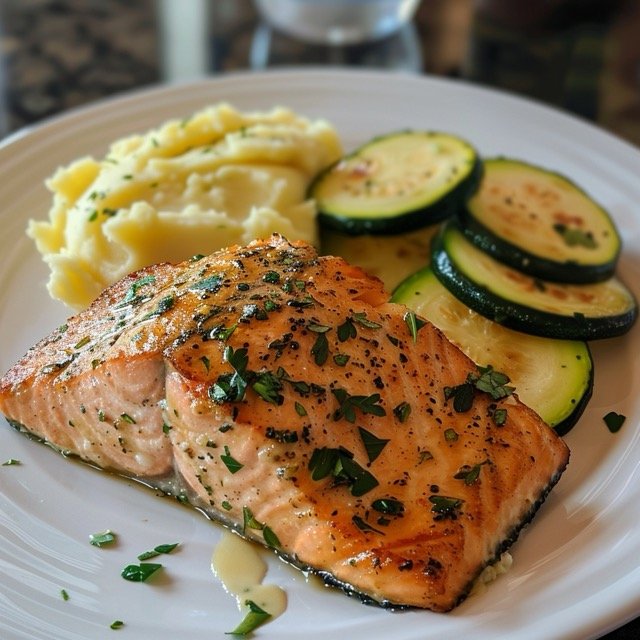
Baked salmon with mashed potatoes and steamed zucchini can be a good option for people with ulcerative colitis (UC), but it’s important to consider specific dietary needs and individual tolerance levels.
Here’s a breakdown of the meal components and why it made the 7-Day Meal Plan for Ulcerative Colitis list:
Baked Salmon
- Benefits: Salmon is a good source of omega-3 fatty acids, which have anti-inflammatory properties and can help reduce inflammation in the colon.
- Nutrient Profile: Rich in high-quality protein and healthy fats, which are essential for overall health and can aid in healing and reducing inflammation.
Mashed Potatoes
- Benefits: Potatoes are generally well-tolerated and provide a good source of carbohydrates, which can be easy on the digestive system.
- Preparation Tips: Ensure the mashed potatoes are made with minimal butter and milk to avoid excess fat and lactose, which can sometimes aggravate UC symptoms. Using lactose-free milk or plant-based milk can be beneficial.
Steamed Zucchini
- Benefits: Zucchini is low in fiber when cooked, making it easier to digest and less likely to irritate the colon. It’s also a good source of vitamins and minerals.
- Preparation Tips: Steaming zucchini makes it soft and easy to digest, which is important for individuals with UC who may have trouble with raw or fibrous vegetables.
General Considerations
- Low-Fiber Focus: To reduce irritation in the colon, a low-fiber diet is often recommended for people with UC, especially during flare-ups. This meal is relatively low in fiber, which can be beneficial.
- Personal Tolerance: Everyone with UC has different triggers, so monitoring how your body responds to specific foods is important. Keep a food diary to track any adverse reactions.
- Avoiding Irritants: Ensure the meal is prepared without spices, heavy oils, or sauces that could potentially irritate the digestive tract.
Baked salmon with mashed potatoes and steamed zucchini can be a good meal option for people with ulcerative colitis, provided it is prepared to minimize potential irritants. It’s always best to consult a healthcare provider or a dietitian to tailor dietary choices to individual needs and symptoms.
Day 2
Breakfast: Rice Cereal with Almond Milk
Rice cereal with almond milk can be a good option for people with ulcerative colitis (UC), but there are several factors to consider:
Benefits:
- Gentle on the Digestive System: Rice cereal is often bland and easy to digest, which can benefit people with UC, especially during flare-ups when the digestive system is more sensitive.
- Low-Fiber Content: Many rice cereals are low in fiber, which can be easier on the colon and help reduce symptoms during a flare-up. High-fiber foods can sometimes irritate the colon and worsen symptoms.
- Dairy-Free: Almond milk is a good alternative to dairy milk, which some people with UC find irritating due to lactose. Almond milk is lactose-free and can be easier on the digestive system.
Considerations:
- Nutrient Content: Ensure the rice cereal is fortified with essential nutrients, as people with UC may have higher nutrient needs or deficiencies due to malabsorption.
- Added Ingredients: Check the labels for any added sugars, artificial ingredients, or preservatives in both the rice cereal and almond milk, as these can sometimes trigger symptoms.
- Almond Milk Additives: Some almond milk contains carrageenan, a thickening agent associated with gastrointestinal inflammation in some studies. Opt for almond milk without carrageenan.
- Individual Tolerance: UC symptoms and triggers can vary widely from person to person. It’s important to monitor how your body responds to rice cereal and almond milk and adjust your diet accordingly.
Practical Tips:
- Choose Plain, Unsweetened Varieties: Opt for plain rice cereal and unsweetened almond milk to avoid unnecessary additives that could irritate your digestive system like (Califia Farms – Organic Unsweetened Almond Milk) (NON-GMO, $6 on Amazon).
- Fortification: Check for rice cereals stacked with vitamins and minerals, especially if you are on a restricted diet.
- Portion Control: Start with small portions to see how your body reacts and gradually increase if tolerated well.
Rice cereal with almond milk can be a gentle and nutritious option for individuals with ulcerative colitis, especially during flare-ups.
However, choosing products with minimal additives and monitoring individual tolerance is essential.
As with any dietary changes, it is advisable to consult with a healthcare provider or a dietitian familiar with UC to ensure it fits within your overall management plan.
Snack: Applesauce
Applesauce can be a suitable food option for people with ulcerative colitis (UC), particularly during flare-ups. Here are some reasons why applesauce is on the 7-Day Meal Plan for Ulcerative Colitis list:
- Easy to Digest: Applesauce is typically well-cooked and pureed, making it easier to digest compared to raw apples. This can be gentle on the digestive system, which is crucial for individuals with UC.
- Low in Fiber: While apples themselves are high in fiber, the process of making applesauce removes much of the fiber. For people with UC, especially during flare-ups, a low-fiber diet is often recommended to reduce irritation in the colon.
- Nutrient-Rich: Applesauce retains many of the vitamins and minerals found in apples, such as vitamin C and potassium, which can help support overall health.
- Hydrating: Applesauce has a high water content, which can help with hydration, an important consideration for those with UC who may experience diarrhea and fluid loss.
- Gentle on the Stomach: The bland nature of applesauce means it is less likely to irritate the digestive tract, making it a safer choice for people with UC compared to spicier or more acidic foods.
However, it is important to consider the following points:
- Added Sugars: Many commercially prepared applesauce contain added sugars or high fructose corn syrup, which can be problematic. It is better to choose unsweetened applesauce to avoid these added sugars. (North Coast Applesauce)
- Individual Tolerances: Every person with UC is different, and some might find that even applesauce can trigger symptoms. It’s important to monitor individual reactions and consult with a healthcare provider to tailor dietary choices accordingly.
In summary, unsweetened applesauce can be a gentle, nutritious, and hydrating option for people with ulcerative colitis, especially during flare-ups when a low-fiber, easy-to-digest diet is recommended. As with any dietary changes, it’s advisable to consult with a healthcare provider to ensure it aligns with individual health needs and conditions.
Lunch: Turkey Sandwich on White Bread with Cucumber Slices
A turkey sandwich on white bread with cucumber slices is on the 7-Day Meal Plan for Ulcerative Colitis list (UC) for several reasons:
- White Bread: White bread is a refined grain that is easier to digest than whole grains, which are high in fiber and can irritate the digestive system during UC flare-ups.
- Turkey: Turkey is a lean protein source less likely to trigger symptoms than red meat, which is high in fat and can exacerbate inflammation.
- Cucumber Slices: Cucumbers are a low-fiber vegetable that can be easily digested. They are also low in insoluble fiber, which can cause bloating and discomfort in people with UC.
Overall, this sandwich combination avoids common trigger foods and focuses on easily digestible ingredients, making it a suitable option for individuals with Ulcerative Colitis.
Snack: Cottage Cheese with Pineapple
Cottage cheese with pineapple can be a suitable snack for some people with Ulcerative Colitis (UC), but individual tolerances vary, and it’s important to consider both the benefits and potential drawbacks.
Benefits:
- Protein-Rich: Cottage cheese is high in protein, which can help maintain muscle mass and support overall health, which is especially important during flare-ups when the body may be under stress.
- Calcium and Vitamin D: Cottage cheese is a good source of calcium and vitamin D, which are essential for bone health. UC patients often need to ensure they get enough of these nutrients, as inflammation and medication can impact bone density.
- Probiotics: Some cottage cheeses contain live cultures (probiotics), which can be beneficial for gut health. Probiotics may help maintain a healthy balance of gut bacteria, potentially aiding in digestion and reducing inflammation.
- Low-Fiber: Cottage cheese is low in fiber, which can be easier on the digestive system for those with UC, especially during flare-ups when high-fiber foods might exacerbate symptoms.
Considerations:
- Lactose Intolerance: Many people with UC are also lactose intolerant. Cottage cheese contains lactose, which can cause bloating, gas, and diarrhea in those sensitive to it. Lactose-free cottage cheese is an alternative.
- Pineapple’s Acidity: Pineapple is relatively acidic and contains bromelain, an enzyme that can sometimes irritate the digestive tract. While it provides vitamin C and manganese, its acidity may not be well-tolerated by everyone with UC.
- Individual Tolerance: UC affects individuals differently. What works for one person might not work for another. It’s essential to monitor how your body reacts to different foods and adjust your diet accordingly.
Recommendations:
- Start Small: If you haven’t eaten cottage cheese with pineapple before, start with a small portion to see how your body reacts.
- Choose Low-Acidity Pineapple: Opt for fresh pineapple that’s fully ripe, as it’s less acidic than unripe pineapple. Alternatively, you could try canned pineapple in natural juice, which tends to be less acidic.
- Lactose-Free Options: If lactose is an issue, look for lactose-free cottage cheese.
- Consult Your Doctor: Always discuss any dietary changes with your healthcare provider, especially if you have a chronic condition like UC. They can provide personalized advice based on your specific health needs.
Overall, cottage cheese with pineapple can be a nutritious option for some people with UC, but it’s crucial to consider individual tolerances and monitor symptoms.
Dinner: Stir-fried Chicken and Vegetables with Rice

- Stir-Fried Chicken: A lean protein source that is easy to digest.
- Vegetables: Choose low-fiber vegetables like bell peppers, onions, and mushrooms.
- Rice: A low-fiber, easily digestible grain that can help manage symptoms.
Day 3
Breakfast: Smoothie with Yogurt, Banana, and Almond milk
A smoothie with yogurt, banana, and almond milk is on the 7-Day Meal Plan for Ulcerative Colitis list (UC) for several reasons:
Yogurt
- Benefits: Yogurt contains probiotics, which are beneficial bacteria that can help maintain gut health and reduce inflammation. For some people with UC, probiotics can help manage symptoms.
- Considerations: Some people with UC might be lactose intolerant or find that dairy exacerbates their symptoms. If that’s the case, lactose-free yogurt or non-dairy alternatives like coconut yogurt might be better options.
Banana
- Benefits: Bananas are generally well-tolerated and easy to digest. They are a good source of potassium, which can be depleted in people with UC due to diarrhea. Bananas also provide a soothing effect on the digestive tract.
- Considerations: Overripe bananas are often better tolerated as they are softer and easier to digest.
Almond Milk
- Benefits: Almond milk is a good non-dairy alternative to cow’s milk. It is low in fat and generally easier to digest, making it a suitable option for people with UC who are sensitive to dairy.
- Considerations: Ensure that the almond milk does not contain carrageenan, an additive that can potentially irritate the gut.
General Tips
- Low-Fiber: During flare-ups, a low-fiber diet is often recommended to reduce irritation. If adding other ingredients to the smoothie, choose low-fiber options.
- Avoid Triggers: Each person with UC may have different trigger foods. It’s essential to monitor symptoms and adjust ingredients accordingly.
Example Smoothie Recipe
- Ingredients:
- 1 cup plain lactose-free yogurt (or non-dairy alternative)
- 1 ripe banana
- 1 cup almond milk (unsweetened and carrageenan-free)
- Optional: A teaspoon of honey for sweetness (if tolerated)
- Instructions:
- Blend all ingredients until smooth.
- Serve immediately and enjoy.
A smoothie with yogurt, banana, and almond milk can be beneficial for individuals with ulcerative colitis if the ingredients are well-tolerated. It’s always best to consult with a healthcare provider or dietitian to tailor dietary choices to individual needs and to ensure they align with the management plan for UC.
Snack: Sliced pears.
Sliced pears are a good snack idea for people and are on the 7-Day Meal Plan for Ulcerative Colitis list (UC) for several reasons:
- Easy to Digest: Pears are a low-fiber fruit that can be easily digested, which is beneficial for individuals with ulcerative colitis who often struggle with high-fiber foods[7].
- Anti-Inflammatory Properties: Pears contain components that actively work to reduce inflammation, which is a key aspect of managing ulcerative colitis[8].
- Nutrient-Rich: Pears are packed with essential vitamins, minerals, and antioxidants that are beneficial for overall health and digestion[8].
- Combination with Cheese: Pairing sliced pears with cheese can provide additional benefits, as cheese is a good source of calcium and protein, and some cheeses contain probiotics that support gut health[8].
- Low Residue: Pears are a low-residue food, which means they can help decrease stool frequency and volume, offering relief from irritation and discomfort associated with ulcerative colitis[8].
Overall, sliced pears are a nutritious and easily digestible snack that can help manage symptoms and support overall health for individuals with ulcerative colitis.
Lunch: Chicken Noodle Soup with White Bread
Chicken noodle soup with white bread is on the 7-Day Meal Plan for Ulcerative Colitis list (UC) for several reasons:
- Low Fiber Content: White bread is made from refined flour, which is lower in fiber compared to whole-grain bread. This is beneficial for people with UC because high-fiber foods can be difficult to digest and may exacerbate symptoms such as diarrhea and abdominal pain.
- Easy to Digest: White bread is a simple carbohydrate easily broken down by the body, reducing stress in the digestive system. This is particularly important during flare-ups when the digestive system is inflamed and sensitive.
- Reduced Irritation: The refined flour in white bread is less likely to irritate the inflamed colon and rectum, which are common symptoms of UC. This can help reduce discomfort and pain associated with eating.
- Comfort Food: Chicken noodle soup is a comforting and familiar food that can provide emotional comfort during illness. Combining the soup with white bread can be a soothing and reassuring meal option.
- Nutrient-Rich: Chicken noodle soup can provide essential nutrients like protein, carbohydrates, and electrolytes, which are important for maintaining energy levels and overall health. Adding white bread can further enhance the meal’s nutritional value.
In summary, chicken noodle soup with white bread is a good option for people with Ulcerative Colitis because it is easy to digest, low in fiber, and can provide comfort and essential nutrients during periods of illness.
Snack: Kefir
Kefir is on the 7-Day Meal Plan for Ulcerative Colitis list (UC) for several reasons:
- Probiotics: Kefir is rich in probiotics that promote gut health, improve digestion, and reduce inflammation.
- Easily Digestible: Kefir is easier to digest than regular milk due to its fermentation process, which breaks down lactose.
- Anti-Inflammatory: The probiotics in kefir have anti-inflammatory properties that can help manage UC symptoms.
- Nutrient-Rich: Kefir provides essential nutrients such as calcium, protein, vitamins B12 and D, and magnesium, supporting overall health.
- Hydration: As a liquid, kefir helps maintain hydration, which is important for managing UC.
- Immune Support: The beneficial bacteria and yeast in kefir support a healthy immune system, which can be particularly helpful for those with UC.
This combination of benefits supports gut health, provides essential nutrients, and is gentle on the digestive system, helping to manage UC symptoms.
Dinner: Grilled Cod with Mashed Sweet Potatoes and Steamed Green Beans

Grilled cod with mashed sweet potatoes and steamed green beans is on the 7-Day Meal Plan for Ulcerative Colitis list (UC) for several reasons:
Grilled Cod
- Lean Protein: Cod is a lean source of protein, which is generally well-tolerated and important for maintaining muscle mass and overall health.
- Low in Fat: It’s low in fat, reducing the risk of exacerbating UC symptoms, as high-fat foods can sometimes cause issues for people with UC.
- Nutrient-Rich: Cod contains essential nutrients like omega-3 fatty acids, which have anti-inflammatory properties that may help manage UC symptoms.
Mashed Sweet Potatoes
- Easy to Digest: Sweet potatoes are generally easier to digest than other starchy vegetables, which can be beneficial during a UC flare-up.
- Nutrient-Dense: They are rich in vitamins (like vitamin A and C) and minerals (like potassium), and provide fiber, which is essential for overall gut health. However, during flare-ups, it’s important to monitor fiber intake.
- Preparation Matters: Mashed sweet potatoes should be prepared without skins and with minimal added fats or spices to avoid triggering symptoms.
Steamed Green Beans
- Low-Fiber Preparation: Steaming green beans makes them easier to digest compared to raw or lightly cooked versions, reducing the risk of irritating the colon.
- Nutrient Benefits: They provide vitamins (like vitamin K and vitamin C) and minerals (like iron and magnesium), contributing to overall nutrition without being too harsh on the digestive system.
Grilled Cod with mashed sweet potatoes and steamed green beans is a recommended meal for people with UC.
- – Prepare the foods in a way that minimizes digestive stress.
- – Customize dietary choices based on individual tolerance levels.
- – Consult with a healthcare provider or dietitian for personalized advice.
Day 4
Breakfast: Oatmeal with Peeled Apples
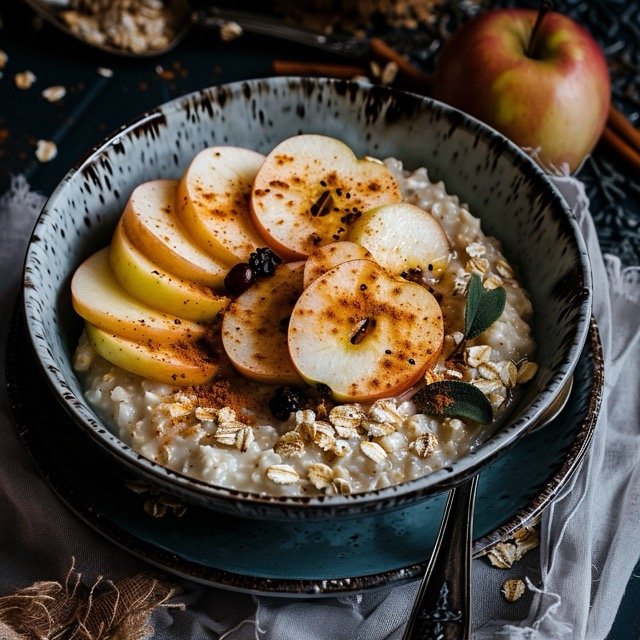
Oatmeal with peeled apples is on the 7-Day Meal Plan for Ulcerative Colitis list (UC) for several reasons:
Benefits:
- Soluble Fiber: Oatmeal is rich in soluble fiber, which can help regulate bowel movements and prevent constipation without irritating the digestive tract.
- Gentle on the Stomach: Oatmeal is typically easy to digest and can soothe the stomach and intestines.
- Anti-inflammatory Properties: Oats contain avenanthramides, compounds with anti-inflammatory properties that may help reduce inflammation in the colon.
- Nutrient-Dense: Oatmeal provides essential nutrients like iron, magnesium, and B vitamins, which can benefit overall health.
Oatmeal with peeled apples can be a nutritious and soothing meal for individuals with ulcerative colitis, provided it is tolerated well. It’s essential to tailor the diet to individual needs and monitor symptoms to ensure it is beneficial and not irritating.
Snack: Hard-boiled Eggs
Hard-boiled eggs are on the 7-Day Meal Plan for Ulcerative Colitis list (UC) for several reasons:
- High in Protein: Eggs are an excellent source of high-quality protein, which is essential for tissue repair and recovery. This is particularly important for individuals with ulcerative colitis, who may experience nutrient deficiencies and muscle loss due to their condition.
- Easily Digestible: Hard-boiled eggs are generally easy to digest, which can benefit those with ulcerative colitis who may have trouble digesting certain foods, especially during flare-ups.
- Nutrient-Rich: Eggs are packed with essential nutrients such as vitamins B12, D, E, and minerals like selenium and zinc, which can support overall health and the immune system.
- Low in Fiber: For those experiencing a flare-up, a low-fiber diet is often recommended to reduce bowel movements and irritation. Hard-boiled eggs are low in fiber, making them a suitable option during these times.
- Anti-Inflammatory Properties: Eggs contain choline, which has anti-inflammatory properties. Reducing inflammation is a key aspect of managing ulcerative colitis.
Lunch: One Pan Garlic Herb Chicken and Potatoes

- Chicken: A lean protein source that is easy to digest.
- Potatoes: A low-fiber, easily digestible starch that can help manage symptoms.
- Garlic and Herbs: Can help reduce inflammation and add flavor without irritating the digestive system.
Snack: Probiotic Yogurt
Probiotic yogurt is beneficial for people with ulcerative colitis (UC) due to its potential anti-inflammatory effects and ability to support gut health. Here are some key points explaining why probiotic yogurt is good for people with UC:
- Anti-inflammatory effects: Probiotic yogurt has been shown to reduce inflammation in the gut, which is a key symptom of UC. Studies have found that probiotic yogurt consumption can lead to a significant decline in serum levels of pro-inflammatory cytokines, such as TNF-α and IL-1β, which are associated with inflammation(https://www.ncbi.nlm.nih.gov/pmc/articles/PMC3920683/).
- Gut health support: Probiotics in yogurt can help restore the balance of the gut microbiota, which is often disrupted in people with UC. This can lead to improved digestion, reduced symptoms of diarrhea and bloating, and enhanced overall gut health[4][5].
- Immune system regulation: Probiotics can modulate the immune system, which is important for people with UC, as the condition is characterized by an overactive immune response. Probiotics can help regulate the immune system, reducing the risk of inflammation and promoting a healthy gut environment[8].
- Symptom relief: Probiotic yogurt has been found to alleviate symptoms of UC, such as diarrhea, abdominal pain, and bloating. It can also help reduce the frequency and severity of flare-ups[7].
- Nutrient absorption: Probiotic yogurt is a good source of protein, calcium, and other essential nutrients, which are important for maintaining overall health and preventing nutrient deficiencies common in people with UC[4][9].
- Easy to incorporate: Probiotic yogurt is a convenient and accessible way to incorporate probiotics into the diet, making it a simple addition to a UC management plan[13].
In summary, probiotic yogurt is beneficial for people with ulcerative colitis due to its anti-inflammatory effects, gut health support, immune system regulation, symptom relief, nutrient absorption, and ease of incorporation into the diet.
Dinner: Baked Tilapia with White Rice and Steamed Broccoli

Baked tilapia with white rice is beneficial for people with Ulcerative Colitis (UC) for several reasons:
- Easily Digestible: Both tilapia and white rice are gentle on the digestive system, reducing discomfort and flare-ups.
- Lean Protein: Tilapia provides high-quality protein essential for tissue repair and muscle maintenance.
- Low Residue: White rice produces less stool bulk, minimizing colon irritation and bowel movements.
- Anti-Inflammatory: Tilapia contains some omega-3 fatty acids, which help reduce inflammation.
- Low Fiber: Both foods are low in fiber, making them suitable during UC flare-ups.
- Minimal Seasoning: Tilapia can be baked with minimal seasoning, avoiding potential irritants.
- Essential Nutrients: The meal offers vitamins and minerals important for overall health.
This combination supports nutritional needs while being easy on the inflamed colon, helping manage UC symptoms.
Day 5
Breakfast: White Toast with Almond butter
White toast with almond butter is a good choice for people with Ulcerative Colitis (UC) for several reasons:
- Easily Digestible: White toast is gentle on the digestive system, reducing discomfort and irritation.
- Low Fiber: White bread is low in fiber, making it suitable during UC flare-ups.
- Healthy Fats: Almond butter provides healthy fats that help reduce inflammation.
- Protein Source: Almond butter offers plant-based protein essential for tissue repair and muscle maintenance.
- Minimal Irritants: Almond butter is typically free from common irritants like dairy and gluten (if using gluten-free bread).
- Nutrient-Rich: Almond butter contains vitamins and minerals, such as vitamin E, magnesium, and calcium, supporting overall health.
This combination provides necessary nutrients while being easy on the digestive system, helping to manage and alleviate UC symptoms.
Snack: Smoothie with Kefir, Banana, and Blueberries
A smoothie with kefir, banana, and blueberries is beneficial for people with Ulcerative Colitis (UC) for several reasons:
- Probiotics: Kefir contains probiotics that promote gut health and reduce inflammation.
- Easily Digestible: Bananas are easy to digest and soothing to the digestive tract.
- Anti-Inflammatory: Blueberries have anti-inflammatory properties that help manage UC symptoms.
- Nutrient-Rich: This smoothie provides essential vitamins and minerals, such as potassium from bananas and antioxidants from blueberries.
- Hydration: Smoothies help maintain hydration, which is important for UC management.
- Low Fiber: Blending reduces fiber content, making it easier on the digestive system during flare-ups.
This combination supports gut health, provides essential nutrients, and is gentle on the digestive system, helping to manage UC symptoms.
Lunch: Grilled Chicken Wrap with White Tortilla and Lettuce

A grilled chicken wrap with a white tortilla and lettuce is beneficial for people with Ulcerative Colitis (UC) for several reasons:
- Lean Protein: Grilled chicken provides high-quality, lean protein essential for tissue repair and muscle maintenance.
- Easily Digestible: White tortillas are gentle on the digestive system, reducing irritation and discomfort.
- Low Fiber: White tortillas and lettuce have low fiber content, making them suitable during UC flare-ups.
- Anti-Inflammatory: Lettuce has mild anti-inflammatory properties, which can help manage UC symptoms.
- Essential Nutrients: The wrap offers essential vitamins and minerals, such as B vitamins from the chicken and vitamins A and K from the lettuce.
- Simple Preparation: Grilled chicken wraps are easy to prepare, providing a quick and nutritious meal option.
This combination supports nutritional needs, is easy on the digestive system, and helps manage UC symptoms.
Snack: Soft Cheese with Sliced Cucumber
Soft cheese with sliced cucumber is beneficial for people with Ulcerative Colitis (UC) for several reasons:
- Easily Digestible: Soft cheese is easier to digest compared to harder cheeses, reducing digestive discomfort.
- Low Fiber: Cucumbers have low fiber content, making them suitable during UC flare-ups.
- Hydrating: Cucumbers are high in water content, helping to maintain hydration.
- Probiotics: Some soft cheeses contain probiotics that promote gut health.
- Essential Nutrients: This combination provides calcium and protein from the cheese, and vitamins A and C from the cucumber.
- Gentle on the Digestive System: Both foods are mild and unlikely to irritate the digestive tract.
This combination offers essential nutrients, is hydrating, and is gentle on the digestive system, helping to manage UC symptoms.
Dinner: Pork Tenderloin with Mashed Potatoes and Steamed Carrots

Pork tenderloin with mashed potatoes and steamed carrots is beneficial for people with Ulcerative Colitis (UC) for several reasons:
- Lean Protein: Pork tenderloin provides high-quality, lean protein essential for tissue repair and muscle maintenance.
- Easily Digestible: Mashed potatoes are easy to digest, reducing the risk of irritation and discomfort.
- Low Fiber: Both mashed potatoes and steamed carrots have low fiber content, making them suitable during UC flare-ups.
- Anti-Inflammatory: Carrots have mild anti-inflammatory properties that can help manage UC symptoms.
- Essential Nutrients: This meal offers vitamins and minerals such as potassium and vitamin C from potatoes and vitamins A and K from carrots.
- Gentle on the Digestive System: The cooking methods used (steaming and mashing) make these foods gentle on the digestive tract.
This combination supports nutritional needs, is easy on the digestive system, and helps manage UC symptoms.
Day 6
Breakfast: Pancakes with a small amount of Maple Syrup
Pancakes with a small amount of maple syrup are beneficial for people with Ulcerative Colitis (UC) for several reasons:
- Easily Digestible: Pancakes made from refined flour are easy to digest, reducing the risk of irritation and discomfort.
- Low Fiber: Pancakes are low in fiber, making them suitable during UC flare-ups.
- Mild Sweetener: A small amount of maple syrup provides a mild sweet taste without heavy sugars that could irritate the digestive system.
- Comfort Food: Pancakes can be a comforting and familiar food, which may help with overall well-being during flare-ups.
- Versatile: Pancakes can be enriched with added nutrients (like using fortified flour) while still being gentle on the digestive system.
This combination offers a gentle, easily digestible meal option that is soothing and unlikely to aggravate UC symptoms.
Snack: Applesauce with Cinnamon
Applesauce with cinnamon is beneficial for people with Ulcerative Colitis (UC) for several reasons:
- Easily Digestible: Applesauce is easy to digest, reducing the risk of irritation and discomfort.
- Low Fiber: Applesauce has low fiber content, especially when made from peeled apples, making it suitable during UC flare-ups.
- Anti-Inflammatory: Cinnamon has mild anti-inflammatory properties that can help manage UC symptoms.
- Hydrating: Applesauce has a high water content, helping to maintain hydration.
- Nutrient-Rich: Applesauce provides vitamins and minerals, such as vitamin C and potassium, which support overall health.
- Gentle Sweetness: The natural sweetness of applesauce, combined with cinnamon, offers a gentle and soothing flavor without added sugars that could irritate the digestive system.
This combination offers essential nutrients, is hydrating, and is gentle on the digestive system, helping to manage UC symptoms.
Lunch: Lentil Soup with White Bread
Lentil soup with white bread is beneficial for people with Ulcerative Colitis (UC) for several reasons:
- Easily Digestible: Lentils in soup form are easier to digest, especially when cooked well, reducing the risk of irritation.
- Low Fiber Option: White bread is low in fiber, making it suitable during UC flare-ups.
- Nutrient-Rich: Lentils provide essential nutrients like protein, iron, and folate, supporting overall health and tissue repair.
- Anti-Inflammatory: Lentils contain compounds with mild anti-inflammatory properties, which can help manage UC symptoms.
- Hydrating: Soup helps maintain hydration, which is important for managing UC.
- Comforting: Warm soup and soft bread are comforting and easy to consume, especially during flare-ups when appetite might be low.
This combination provides essential nutrients, is hydrating, and is gentle on the digestive system, helping to manage UC symptoms.
Snack: Yogurt with Honey
Yogurt with honey is beneficial for people with Ulcerative Colitis (UC) for several reasons:
- Probiotics: Yogurt contains probiotics that promote gut health and reduce inflammation.
- Easily Digestible: Yogurt is generally easy to digest, especially if it is low-fat and plain.
- Anti-Inflammatory: Honey has mild anti-inflammatory properties that can help manage UC symptoms.
- Nutrient-Rich: Yogurt provides essential nutrients like calcium, protein, and vitamins B2 and B12, supporting overall health.
- Gentle Sweetener: Honey offers a natural, gentle sweetness without the harsh effects of refined sugars.
- Hydration: The water content in yogurt helps maintain hydration, which is important for managing UC.
This combination supports gut health, provides essential nutrients, and is gentle on the digestive system, helping to manage UC symptoms.
Dinner: Baked Chicken with Quinoa and Steamed Spinach
Baked chicken with quinoa and steamed spinach is beneficial for people with Ulcerative Colitis (UC) for several reasons:
- Lean Protein: Baked chicken provides high-quality, lean protein essential for tissue repair and muscle maintenance.
- Easily Digestible: Quinoa is generally easy to digest and offers a good source of protein and fiber, which can be tolerated by some people with UC.
- Anti-Inflammatory: Spinach has anti-inflammatory properties, which can help manage UC symptoms.
- Nutrient-Rich: This meal provides essential vitamins and minerals, such as iron, magnesium, and vitamins A, C, and K from spinach, and amino acids from quinoa.
- Hydrating: Steamed spinach has a high water content, helping to maintain hydration.
- Gentle Cooking Methods: Baking and steaming are gentle cooking methods that preserve nutrients while being easy on the digestive system.
This combination supports nutritional needs, is hydrating, and is gentle on the digestive system, helping to manage UC symptoms.
Day 7
Breakfast: Scrambled Eggs with White Toast and Avocado
Scrambled eggs with white toast and avocado are beneficial for people with Ulcerative Colitis (UC) for several reasons:
- Easily Digestible Protein: Scrambled eggs provide high-quality, easily digestible protein essential for tissue repair and muscle maintenance.
- Low Fiber: White toast is low in fiber, making it suitable during UC flare-ups.
- Healthy Fats: Avocado provides healthy fats that can help reduce inflammation and support overall health.
- Nutrient-Rich: Eggs offer essential nutrients like vitamins D and B12, while avocados provide vitamins E, K, and potassium.
- Gentle on the Digestive System: The simplicity of scrambled eggs and the smooth texture of avocado make them gentle on the digestive tract.
- Hydration: Avocado has a high water content, which helps with hydration.
This combination provides essential nutrients, healthy fats, and is gentle on the digestive system, helping to manage UC symptoms.
Snack: Smoothie with Yogurt, Strawberries, and Almond milk
A smoothie with yogurt, strawberries, and almond milk is beneficial for people with Ulcerative Colitis (UC) for several reasons:
- Probiotics: Yogurt contains probiotics that promote gut health and reduce inflammation.
- Easily Digestible: Blended strawberries are easier to digest, reducing the risk of irritation.
- Anti-Inflammatory: Strawberries have anti-inflammatory properties that can help manage UC symptoms.
- Low Lactose: Almond milk is lactose-free, making it easier to digest for those sensitive to dairy.
- Nutrient-Rich: This smoothie provides essential nutrients such as calcium, vitamin C, and antioxidants from strawberries, and vitamins D and E from almond milk.
- Hydrating: The high water content in the smoothie helps maintain hydration.
This combination supports gut health, provides essential nutrients, and is gentle on the digestive system, helping to manage UC symptoms.
Lunch: Tuna Salad with White Bread and Low-fiber Vegetables
Tuna salad with white bread and low-fiber vegetables is beneficial for people with Ulcerative Colitis (UC) for several reasons:
- Lean Protein: Tuna provides high-quality, lean protein essential for tissue repair and muscle maintenance.
- Easily Digestible: White bread is low in fiber and easy to digest, reducing the risk of irritation and discomfort.
- Low-Fiber Vegetables: Including low-fiber vegetables like peeled cucumbers and bell peppers ensures the meal is gentle on the digestive system.
- Omega-3 Fatty Acids: Tuna contains omega-3 fatty acids, which have anti-inflammatory properties that can help manage UC symptoms.
- Essential Nutrients: This meal offers a variety of essential vitamins and minerals, such as vitamins B12 and D, selenium from tuna, and vitamins A and C from the vegetables.
- Hydrating: Low-fiber vegetables have high water content, which helps with hydration.
This combination supports nutritional needs, is gentle on the digestive system, and helps manage UC symptoms.
Snack: Kefir
Kefir is beneficial for people with Ulcerative Colitis (UC) for several reasons:
- Probiotics: Kefir is rich in probiotics that promote gut health, improve digestion, and reduce inflammation.
- Easily Digestible: Kefir is easier to digest than regular milk due to its fermentation process, which breaks down lactose.
- Anti-Inflammatory: The probiotics in kefir have anti-inflammatory properties that can help manage UC symptoms.
- Nutrient-Rich: Kefir provides essential nutrients such as calcium, protein, vitamins B12 and D, and magnesium, supporting overall health.
- Hydration: As a liquid, kefir helps maintain hydration, which is important for managing UC.
- Immune Support: The beneficial bacteria and yeast in kefir support a healthy immune system, which can be particularly helpful for those with UC.
This combination of benefits supports gut health, provides essential nutrients, and is gentle on the digestive system, helping to manage UC symptoms.
Dinner: Grilled Salmon with Mashed Sweet Potatoes and Steamed Green Beans
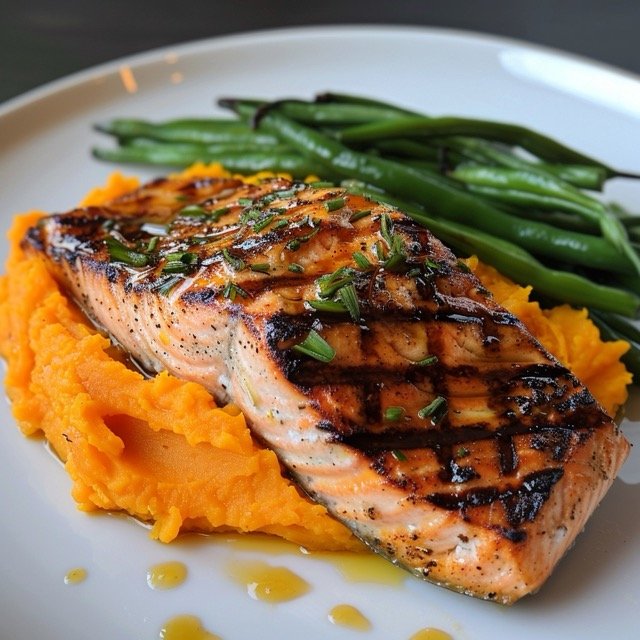
Grilled salmon with mashed sweet potatoes and steamed green beans is beneficial for people with Ulcerative Colitis (UC) for several reasons:
- Lean Protein: Grilled salmon provides high-quality, lean protein essential for tissue repair and muscle maintenance.
- Anti-Inflammatory Omega-3s: Salmon is rich in omega-3 fatty acids, which have strong anti-inflammatory properties that can help manage UC symptoms.
- Easily Digestible: Mashed sweet potatoes are easy to digest and provide a soothing texture for the digestive system.
- Nutrient-Rich: This meal offers essential vitamins and minerals such as vitamins A and C from sweet potatoes, and vitamins K and C, as well as fiber, from green beans.
- Low Fiber: Mashed sweet potatoes and steamed green beans have manageable fiber content, making them suitable during UC flare-ups.
- Hydrating: The high water content in steamed green beans helps maintain hydration, which is important for managing UC.
This combination supports nutritional needs, provides anti-inflammatory benefits, and is gentle on the digestive system, helping to manage UC symptoms.
Conclusion
Managing ulcerative colitis with a well-planned diet can significantly impact the quality of life. This 7-day meal plan for ulcerative colitis is designed to provide balanced nutrition, reduce inflammation, and minimize symptoms.
By incorporating low-fiber foods, lean proteins, healthy fats, probiotics, and maintaining hydration, individuals with UC can manage their condition more effectively.
For further reading, consider exploring Crohn’s & Colitis Foundation resources and consulting with a registered dietitian to tailor a plan that fits your specific needs.
For more information on ulcerative colitis and dietary management, consider these resources:
- Crohn’s & Colitis Foundation
- Mayo Clinic Ulcerative Colitis Guide
- National Institute of Diabetes and Digestive and Kidney Diseases
By adhering to a structured meal plan and staying informed, individuals with ulcerative colitis can lead healthier, more comfortable lives. Stay up to date on FittBeat.
References
[1] https://www.mayoclinic.org/diseases-conditions/ulcerative-colitis/symptoms-causes/syc-20353326
[2] https://www.niddk.nih.gov/health-information/digestive-diseases/ulcerative-colitis
[3] https://www.crohnscolitisfoundation.org/patientsandcaregivers/what-is-ulcerative-colitis
[4] https://www.organics.ph/blogs/articles/10-proven-probiotic-yogurt-benefits-nutrition-facts
[5] https://www.ncbi.nlm.nih.gov/pmc/articles/PMC9455928/
[6] https://www.activia.us.com/what-are-probiotics/what-is-probiotic-yogurt/
[7] https://www.everydayhealth.com/ulcerative-colitis/treatment/pros-cons-probiotics-ulcerative-colitis/
[8] https://www.ncbi.nlm.nih.gov/pmc/articles/PMC2219330/
[9] https://www.medicalnewstoday.com/articles/snacks-for-ulcerative-colitis
[10] https://my.clevelandclinic.org/health/diseases/10351-ulcerative-colitis
[11] https://www.nhs.uk/conditions/ulcerative-colitis/
[12] https://www.healthline.com/nutrition/benefits-of-yogurt
[13] https://zoe.com/learn/best-yogurt-for-probiotics
[14] https://www.ncbi.nlm.nih.gov/pmc/articles/PMC3920683/
[15] https://www.medicalnewstoday.com/articles/317783


